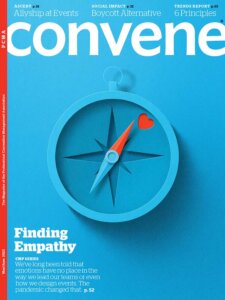
Convene has written a lot about soft skills in the past year.

Michelle Russell
Editor in Chief
If it seems to you like we’ve focused a lot on emotions over the past year, you’re right — and here we are again, talking about cultivating empathy in the May/June cover/CMP Series story. It felt like we were breaking new ground when we published our cover story on mental health in May/June 2022 issue, even though we’ve reported for years on how event organizers have been at the top of most-stressful jobs lists. Then we wrote in October about changing your mindset to embrace uncertainty, new territory for a business that has long relied on solid attendance histories. And in December, we explored why designing events so people feel like they belong there is key to success. Since when, you may be asking, were attendees’ feelings your responsibility?
The answer is always, it’s just something we need to be more intentional about now (see the Guiding Principles report). Our collective pandemic experience has made it impossible to ignore that the way we’ve largely operated — that we all just need to suck it up, carry on, and leave our emotions at home when we go out into the world — is flawed.
On top of that, we now have five generations — Traditionalists, Baby Boomers, Gen X, Millennials, and Gen Z — in the workplace together for the first time, resulting in a stew of feelings connected to our age and lived experiences.

The May/June 2023 Convene cover
According to a recent Harvard Business Review article, only 8 percent of organizations include age as part of their DEI strategy, which consists of encouraging the generations to paper over their differences. “This is a missed opportunity,” the HBR authors write. “Age-diverse teams are valuable because they bring together people with complementary abilities, skills, information, and networks. If managed effectively, they can offer better decision-making, more productive collaboration, and improved overall performance — but only if members are willing to share and learn from their differences.”
I would add that age-diverse teams can also lead to a better sense of well-being. The results of SHRM’s 2023 State of Mental Health & Well-Being in the Workplace research bear that out — the HR association found that mental health challenges persist, with younger generations struggling the most.
Of the 1,000 U.S. workers surveyed for the study, nearly half of Gen Z and Millennial workers say they’ve experienced stress related to their job at least once a week in the last six months, compared to 27 percent of Baby Boomers. More than one in four Gen Z workers (27 percent) say their job made them feel depressed at least once a week, compared to 18 percent of Millennials, 14 percent of Gen Xers, and 7 percent of Boomers and Traditionalists. And nearly a quarter of Gen Z workers and 17 percent of Millennials say their job made them feel lonely at least once a week — compared to only 5 percent of Boomers and Traditionalists.
Perhaps holding dedicated intergenerational meetings — a recommendation made in the HBR article — can help younger workers feel less anxious about work and strip away some of the negative perceptions older workers may have about them. As long as those conversations are grounded in empathy.
Michelle Russell is editor in chief of Convene.
